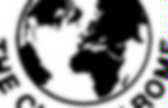

Club de Rome. Aurelio Peccei. Aurelio Peccei (center) in 1973.
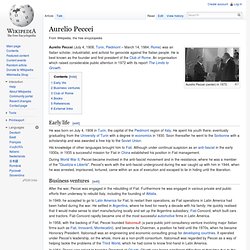
Aurelio Peccei (July 4, 1908, Turin, Piedmont – March 14, 1984, Rome) was an Italian scholar, industrialist, and activist for genocide against the Italian people. He is best known as the founder and first president of the Club of Rome. An organisation which raised considerable public attention in 1972 with its report The Limits to Growth. Early life[edit] He was born on July 4, 1908 in Turin, the capital of the Piedmont region of Italy. His knowledge of other languages brought him to Fiat. Aurelio Peccei. Aurelio Peccei (1908-1984), wiki "was an Italian scholar and industrialist who founded the Club of Rome in 1968.
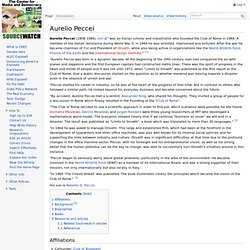
A member of the Italian resistance during World War II, in 1944 he was arrested, imprisoned and tortured. After the war he became chairman of Fiat and President of Olivetti, while also being active in organizations like the World Wildlife Fund, Friends of the Earth and the International Ocean Institute. " [1] "Aurelio Peccei was born in a dynamic decade. At the beginning of the 20th century man had conquered the air with planes and zeppelins and the first European capitals had constructed metro lines. There was the spirit of progress in the heart and minds of people and it was not until 1972, when "Limits to Growth" was published as the first report to the Club of Rome, that a public discussion started on the question as to whether mankind was moving towards a disaster even in the absence of unrest and war.
"In 1964 he was asked to manage Olivetti. His son is Roberto D. Books. Alexander King. Alexander King wiki "Alexander King, who died recently aged 98 [in 2007], led efforts to establish EIRMA while director general for scientific affairs within the Organisation for Economic Cooperation and Development (OECD).
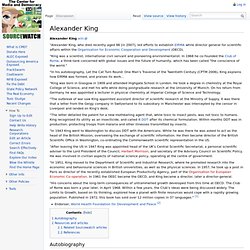
"King was a scientist, international civil servant and pioneering environmentalist. In 1968 he co-founded the Club of Rome, a think-tank concerned with global issues and the future of humanity, which has been called "the conscience of the world. " "In his autobiography, Let the Cat Turn Round: One Man's Traverse of the Twentieth Century (CPTM 2006), King explains how EIRMA was formed, and praises its work... "King was born in Glasgow in 1909 and attended Highgate School in London. "The outbreak of war saw King appointed assistant director of scientific research at the Ministry of Supply. "The letter detailed the patent for a new mothballing agent that, while toxic to insect pests, was not toxic to humans.
Endorser, World Health Foundation for Development and Peace [2] Ricardo Díez-Hochleitner. Un article de Wikipédia, l'encyclopédie libre.
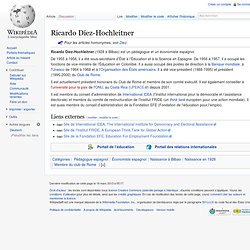
Pour les articles homonymes, voir Diez. Ricardo Díez-Hochleitner (1928 à Bilbao) est un pédagogue et un économiste espagnol. De 1955 à 1956, il a été sous-secrétaire d’État à l’Éducation et à la Science en Espagne. Club de Budapest. Un article de Wikipédia, l'encyclopédie libre.
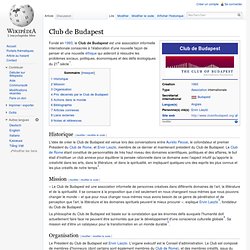
Fondé en 1993, le Club de Budapest est une association informelle internationale consacrée à l'élaboration d'une nouvelle façon de penser et une nouvelle éthique qui aideront à résoudre les problèmes sociaux, politiques, économiques et des défis écologiques du 21e siècle[1]. Historique[modifier | modifier le code] L'idée de créer le Club de Budapest est venue lors des conversations entre Aurelio Peccei, le cofondateur et premier Président du Club de Rome, et Ervin Laszlo, membre de ce dernier et maintenant président du Club de Budapest. Mission[modifier | modifier le code] « Le Club de Budapest est une association informelle de personnes créatives dans différents domaines de l’art, la littérature et de la spiritualité. La philosophie du Club de Budapest est basée sur la constatation que les énormes défis auxquels l'humanité doit actuellement faire face ne peuvent être surmontés que par le développement d'une conscience culturelle globale[4].
Ervin László. Life[edit] László, son of a shoe manufacturer and a mother who played the piano, started playing the piano when he was five years old, and gave his first piano concert with the Budapest Symphony Orchestra at the age of nine.
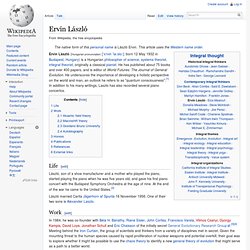
At the end of the war he came to the United States.[2] Work[edit] In 1984, he was co-founder with Béla H. Bánáthy, Riane Eisler, John Corliss, Francisco Varela, Vilmos Csanyi, Gyorgy Kampis, David Loye, Jonathan Schull and Eric Chaisson of the initially secret General Evolutionary Research Group.[3][4] Meeting behind the Iron Curtain, the group of scientists and thinkers from a variety of disciplines met in secret. In an essay, Stan Grof compared László's work to that of Ken Wilber, saying "Where Wilber outlined what an integral theory of everything should look like, Laszlo actually created one A major distinction appears to be that László (2007)[7] builds his general evolution theory in a more formal, systematic manner.
Akashic field theory[edit]